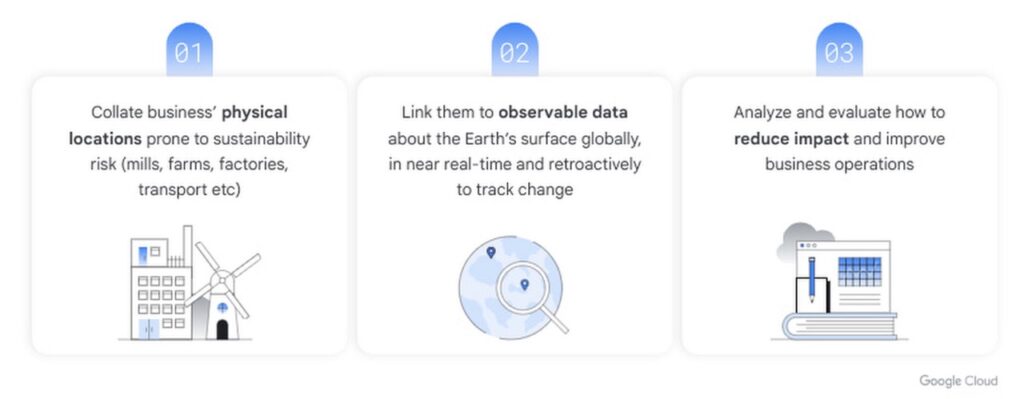Google Earth Engine and a host of new tools promise more sustainable digital transformation
Google Cloud’s own Sustainability Summit was the backdrop this week for a series of initiatives the hyperscaler is offering its customers to better understand and create action related to meaningful environmental impact. The company is introducing a new set of programs and tools aimed at what it calls “sustainable transformation.”
Google Cloud is hoping to provide an important piece of the climate change and impact puzzle in the form of Google Earth Engine. The service hosts satellite imagery in a public data archive that includes 40 years of historical records. Earth Engine is updated daily with new content, which is available for global data-mining using APIs and other tools for large dataset analysis. Google Earth Engine was first launched in 2010, but remained the sole domain of scientists and non-government organizations (NGOs) until more recently.
In 2021, the company announced a preview of Google Earth Engine (GEE) along with a variety of other environmental initiatives. Google said that GEE data helped to develop new solutions for responsible commodity sourcing, sustainable land management and carbon emissions reduction. The tool helps users track, monitor and predict changes in the Earth’s surface due to extreme weather events or human-caused activities. Google Cloud said that this can help its customers defray operational costs, mitigate and manage risks and become more operationally resilient climate threats.

Other new tools joining Google Cloud include an expanded suite of Carbon Sense products. Google Cloud’s portfolio includes specialized tools for reporting gross carbon emissions of Google Cloud services, with tools to help measure and reduce those emissions. Coming next year, said Google, is Carbon Footprint for Google Workspace, which adapts a similar reporting framework, but specifically focuses on the emissions associated with enterprise use of Google office products, like Gmail, Meet, Docs and others.
Google Cloud makes emissions data easier to retrieve
Google Cloud said it’s sharing carbon-free energy insights to its customers through a new pilot program. Customers develop a baseline Carbon-Free Energy (CFE) score and understand their carbon footprint. Google said this will help customers to forecast and plan for an optimized energy portfolio. Eventually, Google hopes the insight program will enable customers to execute on carbon-free energy transactions as well.
Google Cloud is adding new detail to its emissions reporting data, with the addition of Scope 1 and Scope 3 emissions (as determined by the World Resources Institute). Scope 1 emissions are those an organization controls directly. Scope 2 emissions come from energy production used by the organization (those, Google Cloud already measured in Carbon Footprint). Scope 3 emissions are indirect and come from up and down the value chain.
“Users will soon have a comprehensive view of the emissions associated with their Google Cloud usage,” said the company.
It will also make efforts to make Carbon Footprint data more exposed and transparent to simply the process for corporate data collection. That’s happening through the launch of a dedicated Identity and Access Management (IAM) role for Carbon Footprint. IAMs help manage who can do what with which Google Cloud resources.
“This will enable non-technical users of Google Cloud to easily access the emissions data and use it for tracking or in disclosures. You don’t need to be a cloud computing expert to view and export carbon emissions data associated with your cloud usage,” said Justin Keeble, Managing Director of Global Sustainability, Google Cloud.
Google Cloud is also expanding the role of ecosystem partners in its green initiatives. The company announced a new Sustainability validation program, with companies like Carto, Climate Engine, NGIS, GEOTAB, Planet, Atlas AI and Electricity Map already receiving the inaugural designation.

